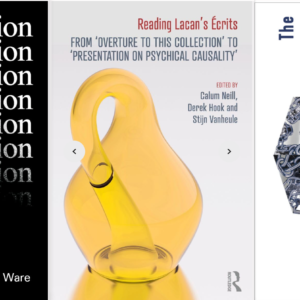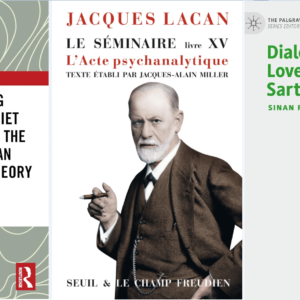News – January 2014
The World Association of Psychoanalysis has announced the launch of Radio Lacan, which began broadcasting on 3rd February. The first podcast was from the École de la Cause Freudienne in Paris on the topic of the next WAP Congress, ‘A Conversation towards a Real for the XXIst century’, featuring a discussion between leading Lacanian psychoanalysts. Regular broadcasts are scheduled every Monday. The site itself is well worth checking out – http://radiolacan.com/en/home. Although the first podcast does not yet appear to have been uploaded, scrolling to the bottom of the page provides links to other audio files featuring interviews with Lacanians, both clinicians and non-clinicians (most of which are however, at present, in languages other than English).
Following up from news previously relayed, in Belgium last month the proposed law to regulate the ‘mental health’ professions was approved by the Health Commission of the Belgian parliament. However, in the course of the parliamentary debates Lorette Onkelinx, vice-prime minister and minister for public health, confirmed that psychoanalysis was not subject to this law which pertained largely to the psychotherapies. All the propositions aiming to include psychoanalysis under the law on psychotherapy have been rejected. In its communiqué on this news, the Association de la Cause freudienne en Belgique stated that “The minister of health and members of the Belgian parliament have thus recognised the specificity of the discipline of psychoanalysis. The approval of this proposed law under these terms is a victory for psychoanalysis, the fruit of a fight which has lasted five months” (translated from the French). You can read the full statement here.
Events
The blog of this year’s NLS Congress, coming up in Ghent, Belgium on 17th and 18th May, went online in January at http://www.nlscongress.org/. The first article by Laure Naveau is titled Le choix des mots [The choice of words] and whilst all the content at present is in French it is likely that English texts will be added over time, as they were for the last NLS Congress in 2013. A call for contributions to the blog followed its launch. Articles of no more than 3,500 words which “advance the theme of fantasm, such as it is taken on in the argument concerning the sign of the Real at stake in a lacanian analysis” are welcome and can be submitted in French to Anne Béraud anne.beraud@pontfreudien.org or to Florencia Shanahan florenciashanahan@gmail.comflorenciashanahan@gmail.com in English.
Another call for papers, this time for a postgraduate conference planned for 14th June organised by the Centre for Psychoanalysis at Middlesex University. The organisers are looking for papers on psychoanalysis or psychoanalytically informed research from any academic discipline on either clinical or theoretical topics that students or trainees are working on. Abstracts of 300 words are requested by 23rd May. More on the event here.
Ahead of the World Association of Psychoanalysis’ Congress coming up in April the Association continues to publish its online journal What’s Up. January saw the 11th and 12th editions published, which are available here and here. What’s more, in January the Congress launched its own presence on Twitter. Follow it here https://twitter.com/ParisAMP2014.
The London Society of the New Lacanian School will host a seminar on Saturday 15th February on the topic of the NLS Congress in Ghent in May, ‘What Cannot be Said – Desire, Fantasy and Real in the 21st Century’. Psychiatrist and psychoanalyst Jean-Louis Gault will look at Seminar VI, with particular reference to the case from Ella Sharpe’s practice that Lacan spends a great deal of time discussing in that seminar. Full details of this event, and the others coming up in the London Society’s agenda, are on the group’s site.
As previously mentioned, Warwick University in the UK is hosting an interesting programme of events under the title ‘Psychoanalysis Across the Disciplines’, with several notable guest speakers scheduled for the coming months. Lacanian psychoanalyst and author Philip Hill will be presenting on the subject of his recent research about the connections between immunology and psychoanalysis on Thursday 6th March. More details of his talk, ‘Are phobias allergies? Is there a difference between immunology and psychoanalysis?’ are on the PAD’s site here.
The NLS-Québec, formed just last September, has announced on its site – http://nls-quebec.org/ – details of its first Study Day on Saturday 1st and Sunday 2nd March. The topic is ‘The Path of Desire’, connected to the recently-published (in French) edition of Seminar VI under the direction of Jacques-Alain Miller. The presentation of five clinical cases on the Saturday will be followed on the Sunday by a presentation by Bruno de Halleux – ‘What is analysis in Lacan’s School?’ – and a ‘lightening’ cartel on Seminar VI. The Study Day is open to all and full details are available on the group’s site here.
On Friday 7th February the Bulgarian Society of Lacanian Psychoanalysis, affiliated with the NLS, will host a seminar on ‘The object of desire’ with commentaries and discussions by Réginald Blanchet, Miléna Jekova and Anélia Vassileva. Full details of the event are on the NLS Messenger here.
London-based Lacanian training and research group CFAR also announced details of its public seminar programme for the first part of 2014 last month and details of its short course for the Spring Term on transference and interpretation.
For French speakers, audio and video of recent events from the Swiss association of the New Lacanian School, ASREEP NLS, can now be found online at http://lecturesfreudiennes.wordpress.com/.
Publications
After 2011’s excellent Lacanian Ethics and the Assumption of Subjectivity by Calum Neill, and Marc de Kesel’s Eros and Ethics the year before comes another book exploring the themes of Lacan’s Seminar VII on Ethics, courtesy of Charles Freeland. Antigone, in Her Unbearable Splendour takes its title from a reference to Sophocles’ heroine that Lacan makes in Seminar VII. Freedland explores the transgressive dimension to the ethics that Lacan presents in that seminar, one of his most interesting for the fact that it darkens as it goes on. Lacan spends much of Seminar VII trying to circumscribe the space where desire yields to jouissance, a space of tragedy, which explains why his recourse is to Sopholes as a frame of reference through which to read Kant, Sade and the utilitarians. Freedland picks up on the fact that for Lacan, “Antigone embodies a drive not toward the transcendent eternality of the Good, but toward death, the death that is always at work in the heart of human life” (ibid, p.6).
Also released in January was a promising-looking book by John Fletcher, Freud and the Scene of Trauma. Fletcher is known best as a Laplanche scholar and has edited many of the latter’s work translated into English, but his careful and precise reading of Freud’s theory of trauma – something that was of great interest to both Laplanche and Lacan when both were contemporaries – will also be of interest to Lacanians.
The tenth volume of Hurly-Burly, the International Lacanian Journal of Psychoanalysis, was released at the end of January. Perhaps most interesting to those who weren’t able to attend it, this edition features English translations of a number of the papers presented at the NLS Congress in Athens last year on ‘The Psychotic Subject in the ‘Geek’ Era’. Buy it at Karnac Books.
Amongst the publications in the French Lacanian newsletter Lacan Quotidien last month was a topical article by Eric Laurent, ‘Racism 2.0’. It takes as its starting point the recent controversy in France caused by the anti-semitic pronouncements of the ‘comedian’ Dieudonné. Laurent connects it to the remarks Lacan makes in Seminar XIX, Ou pire… [… Or worse] in which he prophesies the return of racism as “rooted in the body, in the fraternity of the body” (8th December 1971). In ‘The Knowledge of the Psychoanalyst’, a concurrent seminar that same year, Lacan repeated that prediction, stating that “We are going to be submerged before too
long, in four or five years by all the segregation problems that will be entitled and that
will be castigated by the term of racism” (4th November 1971). The full article, in English, can be found on the WAP’s blog.
French readers may also be interested in a new work by Juan Pablo Lucchelli, Lacan avec et sans Lévi-Strauss [Lacan with and without Levi-Strauss], which was released in January. Lucchelli explores the debt that Lacan owes to Levi-Strauss (most notably in Lacan’s formal definition of the Freudian unconscious) and attempts to cast more light on what Lacan owed to him, drawing on exchanges that the author had with Levi-Strauss between 2000 and 2007.
Finally, how times have changed. Check out these retro pictures of ‘Psychoanalysis’, the comic, from 1955. Unsurprisingly, it lasted for only four issues.
Got news? Get in touch.




Leave a Reply